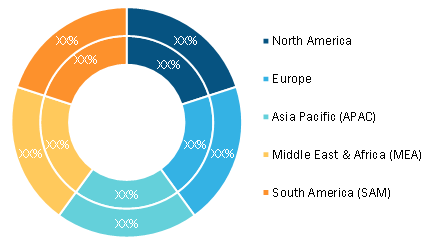Integration of New Technologies to Create Lucrative Opportunities for EV Test Equipment Market during 2022–2028
According to our latest market study on “EV Test Equipment Market Forecast to 2028 – COVID-19 Impact and Global Analysis – by Vehicle Type, Equipment Type, Application, and End-Users,” the market is expected to grow from US$ 35,072.54 million in 2021 to US$ 118,671.47 million by 2028; it is estimated to grow at a CAGR of 20.0% from 2022 to 2028.
Innovative charging station technologies such as turbocharging, terra HP charging, smart charging systems, wireless power transmission, and bi-directional chargers are being developed by electric vehicle (EV) charging station firms. Such advancements in EV charging systems necessitate improved testing techniques. A few companies, including ROLEC, DEKRA, and TUV Rheinland, provide testing systems for EV charging stations. Smart charging is one of the most advanced charging systems. It allows for load balancing and proportional distribution of available power capacity across all active charging stations. Furthermore, it facilitates the collection of critical charging data from various stations using a single cloud-based management platform. Moreover, peak shaving is a technique for preventing unnecessary costs by lowering or interrupting a charging session if the power consumption exceeds a certain threshold. Validation through testing equipment is critical to assure the proper operation of such sophisticated charging systems. As a result, rising R&D in charging stations is likely to boost demand for EV test equipment.
Based on vehicle type, the EV test equipment market is segmented into passenger car, commercial vehicle, and low speed electric vehicles. In 2021, the passenger car segment led the market, accounting for the largest share in the market. Based on equipment type, the market is segmented into battery test equipment, motor test equipment, engine dynamometer, chassis dynamometer, transmission dynamometer, fuel injection pump tester, inverter tester, EV drivetrain test, on-board charger, and AC/DC EVSE. In 2021, the battery test equipment segment led the EV test equipment market, accounting for the largest share in the market. Based on application, the market is segmented into EV component and drivetrain system, EV charging, and powertrain. In 2021, the powertrain segment led the EV test equipment market, accounting for the largest share in the market. Based on end-users, the market is segmented into OEMs, tier 1 suppliers, research and academics, and others. In 2021, the tier 1 suppliers segment led the market, accounting for the largest share in the market. By geography, the market is segmented into North America, Europe, Asia Pacific (APAC), Middle East & Africa (MEA), and South America (SAM). In 2021, APAC accounted for a significant share of the global EV test equipment market.
Impact of COVID-19 Pandemic on Global EV Test Equipment Market
The EV industry is gradually recovering from the significant downturn caused by the COVID-19 pandemic during the first half of 2020. According to EV-volumes.com, the global EV sales in 2021 increased by 108% than in 2020. As per the same report, Tesla led the Original Equipment Manufacturers EV ranking with 436,000 more sales in 2021 compared to 2020. As supply chain and logistics issues are being resolved, the global EV sales are estimated to return to normal growth. Increased sale of EVs is anticipated to boost the demand for advanced EV test equipment and machinery. Testing and certification in the EV landscape cover the charging interfaces and associated systems, enabling various EV components to communicate with one another. Battery and control systems, plug connectors, switches, and wires must ensure vehicle safety and work reliably without interference. A heightened focus on the light-weighting of EV batteries has brought new materials and components into the automotive supply chain, which require quality testing to verify their mechanical properties. Global EV test equipment companies partner and collaborate with several significant players to increase their focus on the research and development of test equipment solutions. Many offer automated and semi-automated testing solutions to improve throughput and generate sustainable profitability with EVs. Testing offers significant cost-reduction opportunities. As a result, labs and R&D centers are adopting automated universal test machines, which is anticipated to propel the global EV test equipment market growth after the emergence of the COVID-19-pandemic.
National Instruments Corporation; Horiba Ltd.; Arbin Instruments; Maccor Inc.; KEYSIGHT TECHNOLOGIES, INC.; Froude, Inc; Dynomerk Controls; Comemso electronics GmbH; Durr Group; TÜV RHEINLAND; INTERTEK GROUP PLC; TOYO SYSTEM CO., LTD; and WONIK PNE CO., LTD are a few key players operating in the global EV test equipment market. Several market players have been analyzed to understand the market.
EV Test Equipment Market — by Region, 2021 and 2028 (%)

EV Test Equipment Market Strategies by 2028
Download Free Sample
EV Test Equipment Market Forecast to 2028 - COVID-19 Impact and Global Analysis By Vehicle Type (Passenger Car, Commercial Vehicle, and Low Speed Electric Vehicles), Equipment Type (Battery Test Equipment, Motor Test Equipment, Engine Dynamometer, Chassis Dynamometer, Transmission Dynamometer, Fuel Injection Pump Tester, Inverter Tester, EV Drivetrain Test, On-Board Charger, and AC/DC EVSE), Application (EV Component and Drivetrain System, EV charging, and Powertrain), and End-Users (OEMs, Tier 1 Suppliers, Research and Academics, and Others)
EV Test Equipment Market Strategies by 2028
Download Free SampleEV Test Equipment Market Forecast to 2028 - COVID-19 Impact and Global Analysis By Vehicle Type (Passenger Car, Commercial Vehicle, and Low Speed Electric Vehicles), Equipment Type (Battery Test Equipment, Motor Test Equipment, Engine Dynamometer, Chassis Dynamometer, Transmission Dynamometer, Fuel Injection Pump Tester, Inverter Tester, EV Drivetrain Test, On-Board Charger, and AC/DC EVSE), Application (EV Component and Drivetrain System, EV charging, and Powertrain), and End-Users (OEMs, Tier 1 Suppliers, Research and Academics, and Others)
Contact Us
Phone: +1-646-491-9876
Email Id: sales@theinsightpartners.com